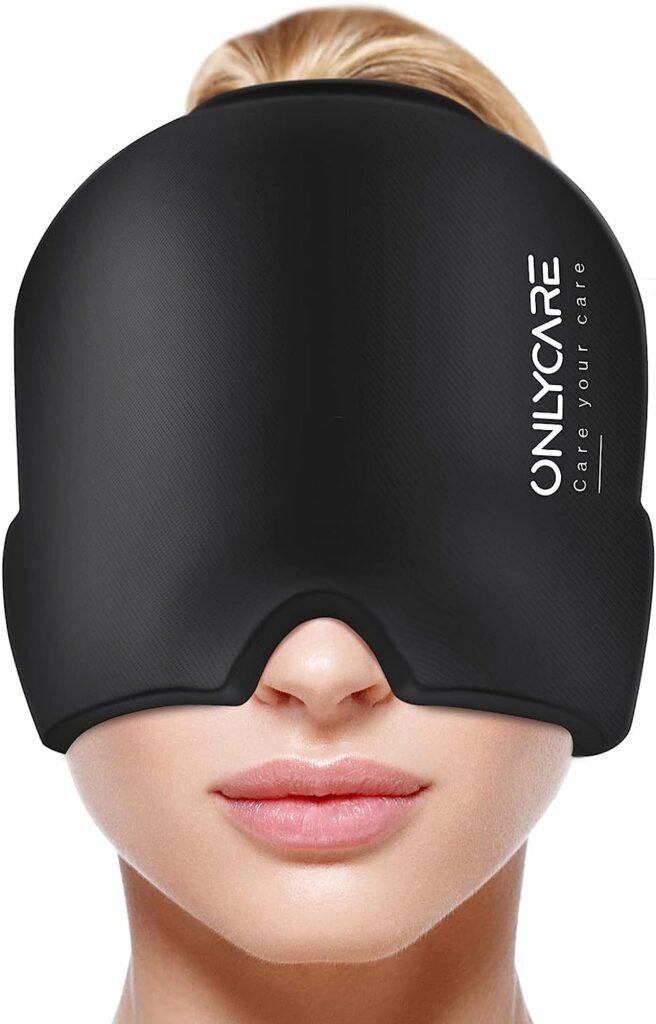Did you know that the causes of vertigo in women are very diverse? While many causes occur in both men and women, there are several of these that are more prevalent in women.
If you are one of the silent victims of this scary experience, then this vertigo article is a must read for you. The article reviews the general causes for men and women, and highlights those that are more prevalent in women.
Table of Contents
Are Vertigo and “Seeing Stars” the Same Thing?
Consider this…….
You stand up suddenly from your chair or get up suddenly from your bed, and an uncontrollable spinning sensation begins around you. This is the first time you experience a vertigo episode.
How did you feel? Did you panic, believing the spinning around you would never stop. Were you sufficiently worried to go to Emergency to seek medical assistance?
As a fellow sufferer, I understand this initial sense of both panic and fear. Knowing the causes is your first step towards gaining back your well being.
Vertigo and “seeing stars” are not the same thing, although they both involve sensations that affect perception and balance.
Vertigo is characterized by a sensation of spinning or movement, either of the individual or their surroundings. It often feels like the room is spinning around you or that you are spinning in space. It is typically associated with inner ear problems or issues related to the vestibular system.
On the other hand, “seeing stars” usually refers to the visual phenomenon of flashing lights or bright spots that appear in a person’s field of vision. This can occur after a sudden blow to the head or as a result of sudden changes in blood pressure, such as when standing up quickly. “Seeing stars” can also be associated with migraines or ocular conditions.
While both vertigo and “seeing stars” can be disorienting and unpleasant, they are distinct phenomena with different underlying causes.
10 General Causes of Vertigo in Women and Men
The causes of vertigo in women can be similar to those in men and may include various factors such as inner ear problems, neurological conditions, medication side effects, and hormonal changes. All-in-all, there are about 10 general causes:
1. Inner Ear Issues: Three problems with the inner ear, such as benign paroxysmal positional vertigo (BPPV), vestibular neuritis, or Meniere’s disease, can disrupt the balance mechanisms and lead to vertigo. More details on each of these are provided in the the section on the causes of vertigo in women below.
a. Meniere’s Disease: This condition involves abnormal fluid buildup in the inner ear, leading to episodes of vertigo, hearing loss, tinnitus (ringing in the ears), and a feeling of fullness in the ear.
b. Infections: Viral infections of the inner ear, such as vestibular neuritis or labyrinthitis, can lead to inflammation and vertigo.
c. Benign Paroxysmal Positional Vertigo (BPPV): This common inner ear disorder occurs when calcium carbonate crystals become dislodged from their usual position in the inner ear and migrate into the semicircular canals causing occurrences of vertigo.
2.Vestibular Migraine: Migraines that involve the vestibular system can cause episodes of vertigo along with other symptoms like headaches and sensitivity to light and sound.
3. Head Injuries: Trauma to the head, such as concussions or other head injuries, can damage the inner ear or vestibular nerve, resulting in vertigo.
4. Medications: Certain medications, especially those that affect the inner ear or vestibular system, can cause vertigo as a side effect.
5. Anxiety Disorders: Severe anxiety or panic attacks can sometimes cause symptoms that mimic vertigo, such as dizziness and feelings of being off-balance.
6. Neurological Conditions: Conditions such as multiple sclerosis or tumors affecting the vestibular system or brainstem can cause vertigo.
7. Dehydration or Electrolyte Imbalances: These can disrupt the normal functioning of the inner ear and lead to vertigo.
8. Cervical Spine Issues: Problems with the cervical spine, such as cervical spondylosis or degenerative disc disease, can sometimes cause vertigo due to compression of blood vessels or nerves that supply the inner ear.
You must consult a healthcare professional if you experience frequent or severe episodes of vertigo, as they can help determine the underlying cause and recommend appropriate treatment.
What Causes Vertigo in Women? – More Prevalent Causes
What causes vertigo in women? In addition to the causes listed for both men and women, certain causes of vertigo are more prevalent in women as they are influenced by hormonal factors. This recurring theme of hormonal changes due to the menstrual cycle, pregnancy, or menopause play a major role.
More prevalent causes of vertigo in women include: inner ear issues, hormonal changes, anemia, autoimmune inner ear disease, and stress and anxiety. Let us explore each in greater detail.
Inner Ear Issues as Causes of Vertigo in Women
a. Meniere’s Disease
Meniere’s disease, which involves abnormal fluid buildup in the inner ear, can affect both men and women, but it is slightly more common in women.
Meniere’s disease is a chronic inner ear disorder characterized by recurring episodes of vertigo, fluctuating hearing loss, tinnitus (ringing in the ears), and a feeling of fullness or pressure in the affected ear.
The exact cause of Meniere’s disease is not fully understood, but it is believed to involve abnormalities in the fluid balance within the inner ear, which can lead to increased pressure in the endolymphatic system.
This disease is more prevalent in women for several reasons. Fluctuations in estrogen levels during the menstrual cycle, pregnancy, or menopause can affect fluid regulation in the inner ear.
In addition, autoimmune factors may contribute, as autoimmune diseases are generally more common in women and have been linked to inner ear disorders like Meniere’s disease.
Furthermore, women tend to seek medical attention more frequently than men, leading to higher diagnosis rates. Finally, genetic predisposition may also contribute to the higher prevalence of Meniere’s disease in women.
b. Benign Paroxysmal Positional Vertigo (BPPV)
Benign Paroxysmal Positional Vertigo (BPPV) is a common inner ear disorder characterized by brief episodes of vertigo triggered by changes in head position, such as rolling over in bed or tilting the head backward. It is more common in women than in men.
It occurs when calcium carbonate crystals called otoconia become dislodged from their usual position in the inner ear and migrate into the semicircular canals, where they can stimulate sensory hair cells inappropriately, leading to vertigo.
BPPV is more prevalent in women due to several factors related to the causes of vertigo in women. Once again, hormonal fluctuations, such as those during menstruation, pregnancy, or menopause, can affect the fluid balance in the inner ear, making women more susceptible to BPPV.
Furthermore, women are also more prone to osteoporosis, a condition characterized by bone density loss. This can lead to greater fragility of the otoconia and the increased likelihood of their dislodgement in the inner ear.
Finally, women tend to have longer life expectancies than men, providing more opportunity for age-related changes in the inner ear, which can predispose them to BPPV.
c. Viral Infections of the Inner Ear
Viral infections of the inner ear, such as vestibular neuritis or labyrinthitis, occur when viruses invade the structures of the inner ear, leading to inflammation and disruption of normal vestibular function. These infections can cause sudden vertigo, often accompanied by nausea, vomiting, and imbalance.
While viral inner ear infections can affect anyone, their prevalence in women may be influenced by hormonal factors and differences in immune response. Hormonal fluctuations throughout a woman’s life, such as during menstruation, pregnancy, or menopause, can affect immune function and susceptibility to infections.
Some studies also suggest that estrogen may play a role in modulating the immune response to viral infections, potentially making women more susceptible. These factors contribute to the higher incidence of viral inner ear infections in women, aligning with what causes vertigo in women.
Hormonal Changes
Hormonal fluctuations play a big role as already mentioned, such as those that occur during menstruation, pregnancy, or menopause which can sometimes trigger or worsen vertigo in women. This is because these changes can affect the fluid balance in the inner ear, contributing to vertigo symptoms.
a. Migraine-Associated Vertigo: Migraine headaches are more prevalent in women, and some women experience vertigo or dizziness as part of their migraine attacks. Hormonal fluctuations can influence migraine patterns, making women more susceptible to migraine-associated vertigo.
b. Pregnancy-Related Vertigo: Vertigo can occur during pregnancy due to hormonal changes, increased blood volume, changes in blood pressure, and other factors. Conditions like BPPV may also be more prevalent during pregnancy.
Anemia
Anemia is a condition characterized by a deficiency of red blood cells or hemoglobin in the blood, leading to reduced oxygen-carrying capacity. It can result from various factors, including iron deficiency, vitamin deficiencies, chronic diseases, or blood loss. Iron deficiency anemia is more common in women
Anemia can cause symptoms such as fatigue, weakness, shortness of breath, and dizziness, which may manifest as vertigo. It is one of the causes of vertigo in women because women often experience blood loss through menstruation, especially those with heavy menstrual periods, leading to iron deficiency anemia.
Women also have higher iron requirements during pregnancy and breastfeeding, increasing their susceptibility to iron deficiency anemia.
Hormonal factors may also play a role, as estrogen can affect iron metabolism and absorption. These factors contribute to the higher prevalence of anemia in women, which in turn may contribute to the symptoms of vertigo.
Thyroid Disorders
Thyroid disorders, such as hyperthyroidism (overactive thyroid) or hypothyroidism (underactive thyroid), occur when the thyroid gland produces too much or too little thyroid hormone, respectively.
These disorders can disrupt various bodily functions, including metabolism, heart rate, and temperature regulation. Thyroid dysfunction has been linked to vertigo, although the exact mechanisms are not fully understood.
Thyroid disorders are more prevalent in women due to several factors related to the causes of vertigo in women. Autoimmune thyroid diseases, such as Hashimoto’s thyroiditis and Graves’ disease, are more common in women, possibly due to hormonal and genetic factors.
In addition, hormonal fluctuations during menstruation, pregnancy, and menopause can influence thyroid function. These factors contribute to the higher prevalence of thyroid disorders in women, which may in turn increase their susceptibility to vertigo.
Autoimmune Inner Ear Disease
This condition involves inflammation of the inner ear structures and can cause vertigo.
Autoimmune diseases occur when the immune system mistakenly attacks the body’s own tissues, leading to inflammation and damage. Several autoimmune diseases have been associated with vertigo, including autoimmune inner ear disease and autoimmune thyroid disorders.
Autoimmune diseases are more prevalent in women, and this higher prevalence may be linked to hormonal and genetic factors. Women generally have a stronger immune response and are more prone to developing autoimmune conditions due to hormonal fluctuations throughout their lives, such as during menstruation, pregnancy, and menopause.
In addition, certain autoimmune diseases have a genetic predisposition, and women may inherit susceptibility genes more frequently. These factors contribute to the increased prevalence of autoimmune diseases in women, which may increase their risk of experiencing vertigo.
Stress and Anxiety
When we think about the causes of vertigo in women, we see that women may be more prone to stress and anxiety disorders.
Stress and anxiety can exacerbate vertigo symptoms, although they are not direct causes of vertigo. Women experience higher rates of stress and anxiety disorders compared to men, which may be influenced by various factors.
Hormonal fluctuations, such as those during menstruation, pregnancy, and menopause, can affect mood regulation and increase susceptibility to stress and anxiety in women. Furthermore, societal and cultural factors may contribute to higher stress levels in women, such as caregiving responsibilities, workplace discrimination, and societal expectations. Women also tend to ruminate more than men, which can exacerbate stress and anxiety.
These factors contribute to the higher prevalence of stress and anxiety disorders in women, which may in turn increase their susceptibility to experiencing vertigo symptoms.
Conclusion – Causes of Vertigo in Women
Women experiencing vertigo must consult a healthcare professional to determine the underlying cause and appropriate treatment plan, especially if the vertigo is severe, persistent, or affecting daily functioning.
Related Articles – What Causes Vertigo in Women?
- Poor Balance in Seniors – Why Oh Why?
- Common Causes of Vertigo or Dizziness – How to Avoid Triggers
- What are the Symptoms of a Stroke – How to Improve Balance
- 19 Causes of Vertigo in Seniors – Most Important
FAQ
What are common causes of vertigo in women?
Common causes include inner ear disorders like benign paroxysmal positional vertigo (BPPV), Meniere’s disease, vestibular neuritis, migraines, hormonal changes during menstruation or menopause, and anxiety or stress.
Can hormonal changes contribute to vertigo in women?
Yes, hormonal fluctuations during menstruation, pregnancy, or menopause can affect inner ear fluid levels, potentially triggering vertigo symptoms. Hormonal therapy or contraceptive use may also influence vertigo episodes.
Are there lifestyle factors that can worsen vertigo in women?
Yes, factors like stress, lack of sleep, dehydration, caffeine or alcohol consumption, and certain medications can worsen vertigo symptoms in women. Managing stress, maintaining hydration, and avoiding triggers can help alleviate symptoms.
References
Mayo Clinic (2022) Dizziness https://www.mayoclinic.org/diseases-conditions/dizziness/symptoms-causes/syc-20371787





